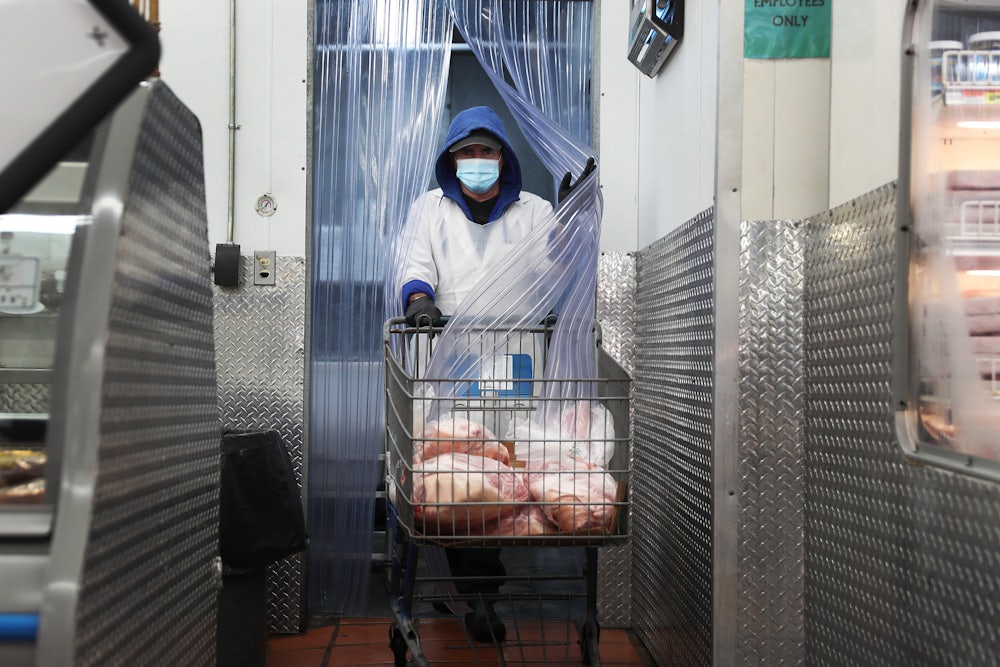Remember hazard pay? That fleeting practice of employers raising essential workers’ wages during the pandemic—also known as a bare-minimum gesture of decency—first surfaced around the same time that New Yorkers were applauding nightly from their windows for frontline personnel and Congress had deigned to pass the first (and so far only) stimulus package. It’s long gone, though. Nine months and 250,000 deaths later, nearly every state in the country is undergoing what experts have called “uncontrolled spread” of the coronavirus, and no further assistance from either the government or the private sector appears to be in order for workers.
Back in the spring, when the unfolding devastation of the pandemic was still new enough to be shocking, grocery stores and retailers like Kroger, Albertsons, and others adopted temporary hazard pay raises for the workers putting their lives at risk to keep the economy (and companies’ profits) moving along. But those bonuses inevitably evaporated, even as Covid-19 continued to spread and the danger to essential workers remained high. (As one Kroger employee put it in an interview with Dissent, “If it’s dangerous enough that you have to require them to wear masks, why wouldn’t you continue that extra pay?”) By the end of the summer, Amazon, Walmart, and several grocery chains had all quietly ended hazard pay for their workers; Kroger, incredibly, even claimed at one point that some employees had been overpaid and asked them to return the money, prompting a public backlash.
But one of the bleakest aspects of pandemic hazard pay is that it was never actually particularly widespread to begin with. A survey conducted by the Economic Policy Institute in June found that only about 30 percent of people working outside of their homes during the pandemic had received hazard pay increases, and that number is almost certainly lower now that most of the businesses that previously adopted hazard pay have ended the practice. That’s especially dismal given that so many essential workers are also low-wage workers: As the Brookings Institution recently noted, nearly half of all essential workers earn less than a living wage.
And yet, as these workers continue to risk their lives by reporting to work, Amazon, Instacart, and other companies that rely on them to turn a profit have seen record sales and soaring stock prices. According to a new report from the groups Bargaining for the Common Good, United for Respect, and the Institute for Policy Studies —which has tracked the staggering explosion of billionaires’ riches throughout the pandemic as the economy at large has cratered—the owners of Walmart and Tyson Foods, and, of course, Jeff Bezos, have all seen their wealth increase by hundreds of millions of dollars, sometimes billions, over the last nine months. “These billionaire owners are like military generals sitting in protected bubbles sending their workers into the viral line of fire with insufficient shields,” Chuck Collins of the IPS said in a press statement. So much, I guess, for being in this together.
That companies reverted to their baseline greed after a brief spell of extremely limited willingness to raise their workers’ wages isn’t, of course, massively surprising. “If employers don’t have to provide hazard pay, they won’t,” Nicole Hallett, a law professor at the University of Chicago told CNN over the summer. “The fact that many companies have ended their hazard pay policies tells me they feel it’s no longer needed to attract workers.” These are, after all, the same entities that bitterly fought any attempts by workers to unionize or press for higher wages, even prior to the pandemic. Wantonly stuffing workers into crowded meat-processing plants and distribution warehouses without sufficient protective equipment, let alone hazard pay, is mostly business as usual.
Rather, the more profound failure at this moment is in a government that has collectively refused to pass any kind of legislation mandating fair compensation or better protections for workers during an out-of-control pandemic. While a handful of states like Vermont have successfully launched statewide hazard pay programs using funds from the first stimulus, on a federal level, all proposals for mandating hazard pay for essential workers have vanished into the congressional quagmire. House Democrats’ second stimulus bill included a provision for federally mandated hazard pay, and back in April, Elizabeth Warren and Ro Khanna introduced an Essential Workers’ Bill of Rights that included “robust premium pay” for frontline workers. But as we well know at this point, those proposals have essentially idled in the congressional trash can for months.
“This will get worse,” an official at the Department of Health and Human services told CNN on Thursday. Though we’ve heard that same warning for the better part of a year now, what makes this moment even more harrowing is that the relative goodwill that defined the start of the pandemic—including employers’ and Congress’s willingness to entertain hazard pay—has seemingly disappeared. The casualties of that indifference over the next few weeks will include the very workers we’ve been so quick to call “essential.”
